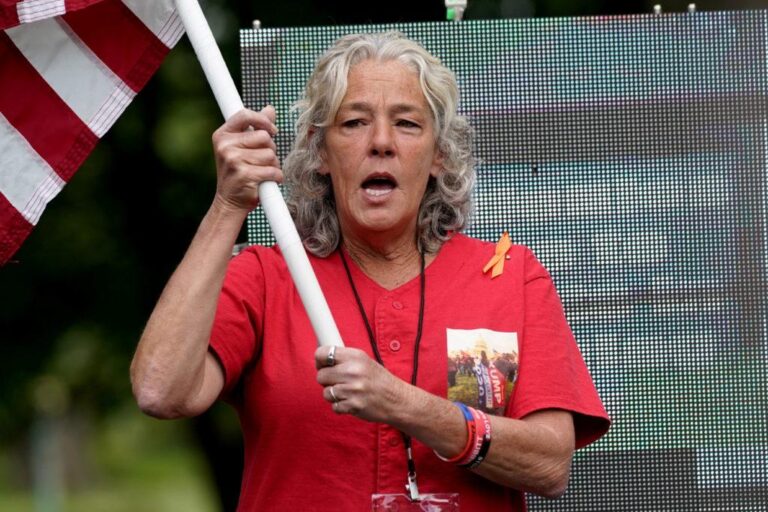Military Funeral Honors Granted to Ashli Babbitt: Navigating Controversy and Commemoration
Military Tribute to Ashli Babbitt: A Complex Intersection of Service and Circumstance
The United States military recently bestowed full funeral honors upon Ashli Babbitt, the former Air Force veteran who was fatally shot amid the January 6 Capitol breach. This gesture, rooted in military tradition, has ignited intense debate regarding the appropriateness of honoring a figure involved in a highly contentious and violent event. While some view the honors as a rightful acknowledgment of Babbitt’s prior military service, others argue that the context of her death complicates the narrative of valor and sacrifice.
Military funeral honors typically encompass several ceremonial acts designed to pay respect to those who have served the nation. In Babbitt’s case, these included:
- Presentation of the folded American flag: A symbolic gesture expressing the nation’s gratitude to the family of the deceased.
- Three-volley rifle salute: A traditional military tribute signifying farewell to the fallen.
- Performance of “Taps”: A solemn bugle call marking the conclusion of the ceremony and honoring the service member’s memory.
| Ceremonial Element | Significance |
|---|---|
| Flag Presentation | Represents national respect and appreciation |
| Rifle Salute | Traditional military farewell |
| “Taps” Bugle Call | Symbolizes final honors and remembrance |
Understanding the Protocols Behind Military Funeral Honors
Military funeral honors are governed by established protocols designed to honor veterans and active-duty personnel alike. Although Ashli Babbitt was not serving at the time of her death, her status as a veteran qualified her for these rites. The ceremony was conducted by an honor guard, a specialized unit trained to perform these solemn duties with precision and respect.
Key components of the ceremony included:
- Flag Folding and Presentation: The American flag was meticulously folded into a triangular shape and formally handed to Babbitt’s next of kin, symbolizing the nation’s enduring gratitude.
- Three-Volley Salute: A rifle team executed a three-shot volley, a time-honored military gesture to honor the deceased.
- “Taps” Performance: A bugler played the poignant melody “Taps,” traditionally used to mark the end of a soldier’s duty and life.
- Honor Guard Participation: Uniformed military personnel conducted the ceremony, ensuring adherence to ceremonial standards and decorum.
| Protocol | Purpose | Participants |
|---|---|---|
| Flag Folding | Expresses national appreciation | Honor Guard |
| Rifle Salute | Military farewell | Rifle Detail |
| “Taps” | Final tribute | Bugler |
| Flag Presentation | Gift to family | Officer or NCO |
Public and Political Responses to the Military Honors
The announcement of military funeral honors for Ashli Babbitt has elicited a spectrum of reactions from government officials and the public alike. Some political figures have underscored the importance of separating military protocol from political controversies, emphasizing that honoring veterans is a duty irrespective of the circumstances surrounding their deaths. A Pentagon representative remarked, “Our commitment is to honor those who have served, independent of political discourse.”
Public sentiment remains deeply divided:
- Supporters: View the honors as a deserved recognition of Babbitt’s military service and personal sacrifice.
- Opponents: Criticize the decision, arguing that it inadvertently legitimizes participation in the Capitol insurrection.
- Neutral parties: Advocate for clearer military guidelines to navigate politically sensitive cases in the future.
| Group | Perspective | Response Intensity |
|---|---|---|
| Military Leadership | Support honoring veterans per protocol | Strongly supportive |
| Democratic Officials | Condemn riot; caution on honors | Critical |
| Conservative Lawmakers | Defend service and individual rights | Generally supportive |
| General Public | Mixed and polarized views | Highly divided |
Guidelines for Future Handling of Participants in Politically Charged Events
Moving forward, it is essential for authorities to develop clear, consistent policies when addressing cases involving individuals linked to politically sensitive incidents such as the Capitol riot. Balancing national security concerns with respect for individual rights requires nuanced approaches that consider the nature of each participant’s actions and their cooperation with legal processes.
Recommended strategies include:
- Improved Intelligence Sharing: Strengthen inter-agency communication to identify potential threats and prevent violent escalations before they occur.
- Uniform Legal Procedures: Establish standardized frameworks for prosecuting offenses against government institutions, ensuring fairness and transparency.
- Community Engagement Initiatives: Promote educational programs and dialogue aimed at addressing the root causes of radicalization and fostering social cohesion.
- Clear Honors Policies: Define criteria for awarding military honors in cases involving controversial circumstances to maintain respect and avoid public discord.
| Action | Objective | Expected Result |
|---|---|---|
| Intelligence Coordination | Early threat detection | Reduction in violent incidents |
| Legal Standardization | Consistent justice application | Enhanced public trust |
| Community Programs | Address radicalization causes | Long-term societal stability |
| Honors Policy Development | Respectful and clear recognition | Minimized community division |
Conclusion: Reflecting on Honor, Accountability, and National Memory
The military’s decision to grant funeral honors to Ashli Babbitt has become a focal point in the ongoing national conversation about how to remember and interpret the events of January 6, 2021. This development highlights the challenges of reconciling respect for military service with the complexities of political and social accountability. As America continues to process the ramifications of that day, the debate over Babbitt’s commemoration underscores the broader struggle to balance justice, patriotism, and collective memory in a deeply divided society.




